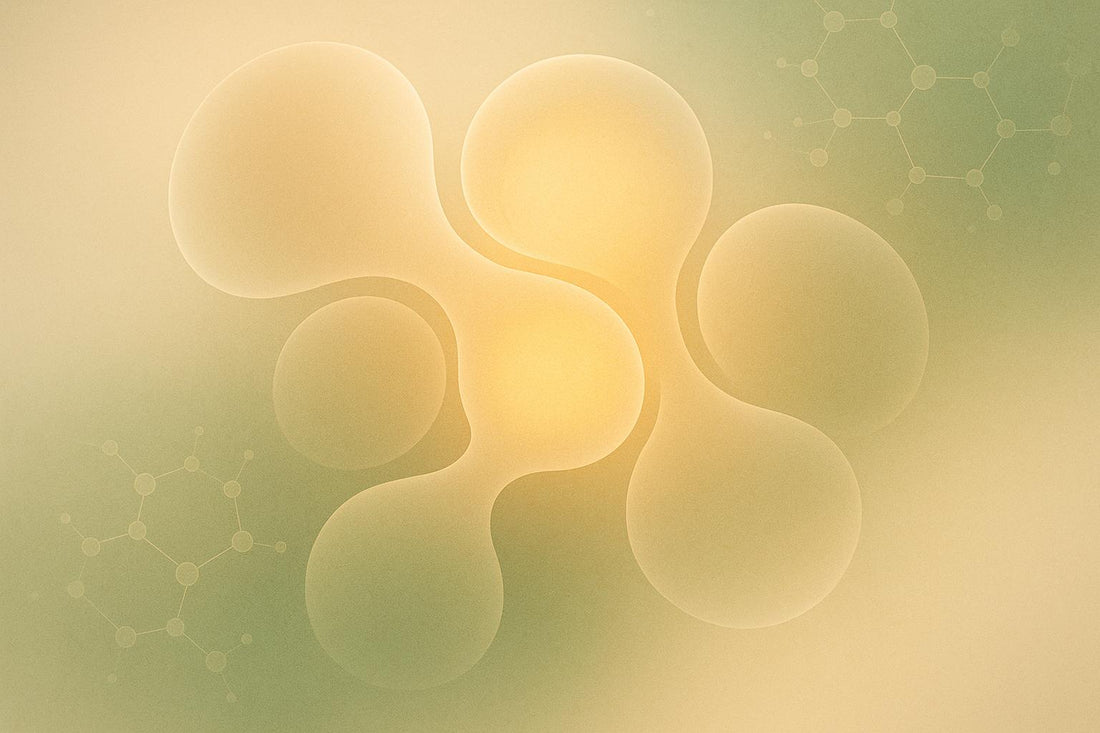Endocrine Disruptors (EDCs) are chemicals in everyday items like plastics, cosmetics, and cookware that interfere with hormones and can speed up aging by altering gene expression. These changes, called epigenetic aging, affect DNA methylation, histone modifications, and chromatin structure, leading to health risks like impaired cell repair and age-related diseases.
Key EDCs and Their Impact:
- BPA: Found in plastic containers, disrupts DNA methylation.
- Phthalates: In cosmetics, causes histone changes.
- PFAS: In non-stick cookware, alters chromatin structure.
How to Reduce Exposure:
- Use glass or stainless steel for food storage.
- Avoid heating food in plastic.
- Choose organic produce to limit pesticides.
- Filter drinking water and improve indoor air quality.
These steps, combined with a healthy lifestyle and supplements like NMN or Resveratrol, can help protect your cells and slow aging.
Embryonic BPA Exposure Causes Liver Disease in ...
EDC Effects on Aging Mechanisms
Building on earlier discussions about hormone disruption and epigenetic aging, let’s explore how endocrine-disrupting chemicals (EDCs) intensify these processes.
Hormones and Cell Aging
EDCs interfere with hormone signaling, which is crucial for maintaining healthy cells. These chemicals don’t just mimic or block hormones - they can cause lasting damage, especially when exposure surpasses the body’s ability to repair itself.
Epigenetic Changes Linked to EDCs
EDCs also contribute to aging by altering epigenetic markers. They can disrupt DNA methylation and histone modifications, which are key regulators of gene expression. These changes directly speed up cellular aging by affecting how genes function.
Long-term Health Risks of EDC Exposure
Prolonged exposure to EDCs can lead to chronic cellular issues, increasing the risk of age-related diseases. The combination of disrupted hormones and altered epigenetics has a compounding effect on overall cell health. This highlights the importance of minimizing EDC exposure in everyday life.
Common EDC Sources
Everyday food, beverages, and household items can expose us to endocrine-disrupting chemicals (EDCs). Here's a closer look at some common sources:
Food and Drink Sources
Certain food-related materials and practices can introduce EDCs into what we consume:
- Food packaging: Heated plastic containers and metal can linings often release BPA and similar chemicals.
- Pesticide residues: Found on conventionally grown fruits and vegetables.
- Non-stick cookware: Many contain PFAS chemicals that can leach into food.
- Receipt paper: Often coated with BPA, which can transfer to your skin.
Home and Beauty Products
Many personal care and household items contain EDCs, particularly in fragrances and cleaning products. Examples include:
- Fragranced personal care products, such as lotions and shampoos.
- Antibacterial soaps containing triclosan.
- Vinyl shower curtains.
- Air fresheners and cleaning products with synthetic fragrances.
Environmental Sources: Air, Water, and Soil
Our surroundings also play a major role in EDC exposure. Here's how:
| Environmental Source | Common EDCs | Primary Exposure Route |
|---|---|---|
| Air | Dioxins, PCBs | Inhalation |
| Tap Water | PFAS, Atrazine | Drinking, Cooking |
| Soil | Pesticides, Heavy Metals | Garden produce, Dust |
Tips to Reduce Exposure
You can take steps to limit your contact with EDCs:
- Install a certified water filter to reduce contaminants.
- Use air purifiers with activated carbon to improve indoor air quality.
- Opt for organic produce when possible to avoid pesticide residues.
- Regularly clean your home to minimize dust, which can carry EDCs.
sbb-itb-4f17e23
Steps to Reduce EDC Exposure
Food Choices and Storage
Making smarter food choices and using safer storage options can help limit exposure to endocrine-disrupting chemicals (EDCs). Switch out plastic containers for glass or stainless steel to avoid chemical leaching.
Here are some practical tips for reducing EDC exposure through food:
- Opt for fresh, whole foods instead of processed items in plastic packaging.
- Store dry goods in glass jars with tight-fitting lids.
- Avoid heating food in plastic containers, as heat can release harmful chemicals.
- Transfer takeout meals to glass containers as soon as possible.
- Choose BPA-free canned foods when canned options are necessary.
Below, you'll find additional safe container options to make your food storage even safer.
Safe Container Options
Pair your food choices with these safer storage alternatives:
- Tempered Glass: Great for hot, cold, and freezer storage.
- 18/8 Stainless Steel: Ideal for dry goods and lunch containers.
- Silicone: Best used for container seals and baking tools.
Supporting Cell Health
Reducing EDC exposure works best when combined with steps that support cell health. Supplements that target cellular function can play a key role in managing epigenetic aging.
MASI Longevity Science offers supplements designed to support key cellular processes. For best results, take 1 capsule daily if you're between 40–50 years old, and 2 capsules daily if you're over 50.
Boost the effectiveness of your supplement routine with these habits:
- Exercise regularly to maintain overall health.
- Practice stress management techniques to support mental and physical well-being.
- Aim for 7–9 hours of quality sleep each night.
- Drink plenty of filtered water to stay hydrated.
- Include antioxidant-rich foods in your meals for added cellular protection.
"MASI Longevity Science supplements are crafted in Germany using the finest raw materials and independently tested in Switzerland for purity, safety, and effectiveness. Our products are free from GMOs, soy, lactose, gluten, and allergens, making them suitable for various dietary requirements including vegan, Halal, and Kosher diets."
MASI Longevity Science Solutions

MASI Anti-aging Supplements
MASI Longevity Science provides supplements designed to address endocrine disruptors and support healthy aging. These products are crafted with a focus on effectiveness and uncompromising quality.
| Supplement | Dosage | Key Benefits |
|---|---|---|
| Premium NMN | 1,000 mg | Helps with cellular energy and DNA repair |
| Premium Resveratrol | 500 mg | Supports cellular protection and aging health |
| Premium Spermidine | 3 mg | Encourages cellular renewal and autophagy |
| Premium Fisetin | 500 mg | Assists in clearing senescent cells |
These supplements are designed to work together, enhancing the body's natural defenses while promoting cellular health and renewal.
MASI Quality Standards
Purity and quality are critical when addressing endocrine disruptors. MASI ensures top-tier standards through:
- Production in a cutting-edge German facility
- Raw materials sourced from trusted German suppliers
- Independent testing in Switzerland for purity, microbiology, and heavy metals
- QR code access for batch-specific test results
"At MASI, we pride ourselves on offering the purest and highest quality products to support your health and longevity journey. Our supplements are manufactured to a standard not yet seen in the industry, setting a new benchmark for product quality. The MASI benchmark." [1]
Using MASI Products
To maximize the benefits of MASI supplements, follow these guidelines:
For ages 40-50:
- Take 1 capsule daily with breakfast
- Stick to the same time each day
- Store in a cool, dry place away from sunlight
For ages 50 and above:
- Increase to 2 capsules daily
- Space doses 12 hours apart for consistent effects
- Monitor how your body responds and adjust if necessary
MASI supplements are free from GMOs, soy, lactose, gluten, and common allergens. They cater to various dietary needs, including vegan, Halal, and Kosher diets.
"To ensure guaranteed safety and quality, every batch of MASI anti-aging supplements undergoes independent verification by an accredited testing facility in Switzerland." [1]
Conclusion: Managing Epigenetic Health
EDC Impact Summary
Endocrine disruptors (EDCs) can affect how our cells age by interfering with various biological processes. These chemicals may speed up cellular aging, disturb hormonal balance, and raise the likelihood of developing age-related conditions. Reducing EDC exposure is an important step toward better health and longevity.
Key effects of EDCs on epigenetic aging include:
- Changes in DNA methylation patterns
- Impaired cellular repair mechanisms
- Disruption of hormone signaling
- Accelerated cellular aging
Adopting practical steps can help minimize these effects.
Next Steps for Better Health
Tackling the impact of EDCs involves a combination of lifestyle changes and targeted support for your cells.
Lifestyle and Dietary Tips
- Opt for organic fruits and vegetables when possible.
- Use glass or stainless steel containers for food storage.
- Install a water filter for cleaner drinking water.
- Avoid microwaving food in plastic containers.
- Switch to natural cleaning products.
- Choose personal care items free from EDCs.
- Keep your living spaces well-ventilated.
- Stay active with regular exercise to support cellular health.
Support for Cellular Health
For those over 40, certain supplements can help maintain epigenetic health. MASI offers supplements with ingredients like NMN, Resveratrol, Spermidine, and Fisetin, which aid in protecting cells, repairing DNA, and promoting vitality. Recommended dosage: 1 capsule daily for ages 40-50, or 2 capsules daily for individuals over 50.
MASI Longevity Science ensures all supplements are independently tested in Switzerland for purity, safety, and effectiveness. They use high-quality raw materials sourced and produced in Germany.
FAQs
How do endocrine disruptors impact epigenetic markers like DNA methylation and histone modifications?
Endocrine disruptors can interfere with the body's hormonal balance, which in turn may influence epigenetic markers such as DNA methylation and histone modifications. These changes can disrupt normal gene expression and potentially accelerate biological aging processes.
To minimize exposure to endocrine disruptors, consider avoiding products containing harmful chemicals like BPA, phthalates, and parabens. Opt for natural, non-toxic alternatives whenever possible and maintain a healthy lifestyle to support your body's natural detoxification processes.
How do endocrine disruptors impact aging and increase the risk of age-related diseases?
Endocrine disruptors are chemicals that interfere with hormone function, potentially altering the body's natural processes, including those that regulate aging. These substances can affect epigenetic mechanisms, which are responsible for turning genes on or off, and may accelerate biological aging or contribute to the development of age-related diseases like cardiovascular issues, diabetes, and certain cancers.
To reduce exposure, consider avoiding products containing harmful chemicals such as BPA, phthalates, and certain pesticides. Opt for glass or stainless steel containers over plastic, choose organic produce when possible, and check personal care product labels for safer alternatives. Supporting your body's cellular health with scientifically-backed supplements, like those offered by MASI Longevity Science, may also help promote vitality and resilience against environmental stressors.
How can I reduce exposure to endocrine disruptors, and can this help slow down epigenetic aging?
Reducing exposure to endocrine disruptors can play a role in supporting overall health and potentially mitigating their influence on epigenetic aging. These chemicals, found in everyday products like plastics, personal care items, and pesticides, can interfere with hormonal balance and impact cellular processes linked to aging.
To minimize exposure, consider these practical steps:
- Choose BPA-free products: Opt for glass, stainless steel, or BPA-free plastics for food and drink storage.
- Use natural personal care products: Look for items free from parabens, phthalates, and synthetic fragrances.
- Wash fresh produce thoroughly: This helps reduce pesticide residues. When possible, choose organic options.
- Avoid microwaving plastics: Heating plastics can release harmful chemicals into food.
While these steps may not fully eliminate exposure, they can reduce your overall risk and support healthier aging. For a science-backed approach to longevity, MASI Longevity Science offers premium supplements like NMN and Resveratrol, designed to target key aging mechanisms and promote cellular health.




